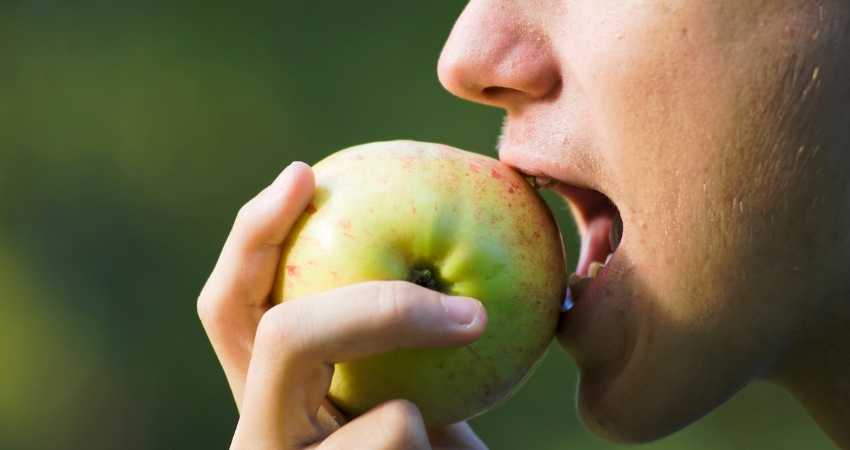Why Mangos Taste Like Pine
If you’ve ever bitten into a Mango and had your mouth flooded with the overwhelming flavor of a pine grove, you may have wondered exactly what’s going on. This leaves many people asking, why do mangos taste like pine?
Mangos taste like pine because they’re not fully ripe and have potentially potent compounds. There are 30 chemicals that make up mangos, there are five important ones that mangos share with pine needles: α-pinene, β-pinene, limonene, myrcene and camphene.
If you prefer sweet and fruity rather than piney, you’ll have to wait for them to ripen.
This article will further discuss the chemicals pine needles and mangos share and explore the science behind the strange taste phenomenon.

Mangos & Pine Needles Share 5 Important Chemicals
Mangos share five key components of their chemical makeup with pine needles. These five components are:
- A-pinene
- Β-pinene
- Limonene
- Myrcene
- Camphene
Incidentally, these five chemicals are somewhat responsible for the distinctive smell for which pine needles are known1.
Since a human’s sense of taste is strongly linked to his sense of smell, picking up on these chemicals in mangos affects both senses, making you smell and taste pine.
There’s also another flavor compound found in mangos that contributes to the piney taste2. It’s called 3-carene, and it’s what’s also known as a terpene3. Terpenes are most often found in conifers, like pine trees, and give off a woodsy, piney aroma and flavor.
Unripe Mangos Often Have a Pine-Needle Taste
If you’re less interested in the science behind the issue of why mangos taste like pine and want a simple answer, I’ve got you covered there, as well.
In short, if your mango tastes like pine, it probably isn’t fully ripe. The scent, flavor, and texture of an unripe mango are entirely different from the scent, flavor, and texture of that same mango once it’s ripened.
This is most likely because the terpenes and other above-listed chemicals are more potent and more prevalent when a mango is unripe. The more prevalent these chemicals are, the more likely you’ll be to taste pine when you eat the mango.

Ripe Mangos Taste Sweet & Fruity
As mangos ripen, the afore-mentioned chemicals are toned down some. The pine flavor gives way in favor of the more traditional sweet, fruity flavor generally associated with mangos.
It’s important to remember there are several mango varieties4. Although none of them should taste like pine when ripe, some of them are naturally a little more tart and/or bitter than others.
In most parts of The United States, the most commonly sold mango varieties are Hayden mangos and Tommy Atkins mangos. They’re both naturally sweet, although the Hayden variety may have a slightly bitter aftertaste. The Tommy Atkins variety is more tart than some mangos.
How To Tell if a Mango Is Ripe
Because there are so many different mango varieties, there’s no single way to tell when a mango is fully ripe based solely on color5.
The Hayden and Tommy Atkins mangos will be primarily red when ripe while the honey mango has no red on it at all. Instead, it’ll turn a deep yellow when it’s fully ripened. On the other hand, Keitt and Kent mangos stay mostly green even once they’re at peak ripeness6.
One of the best ways to tell if a mango of any variety is ripe is to squeeze it. An unripe mango won’t give under your squeeze. It’ll remain hard and firm like a green apple.
If the mango gives when you squeeze it, much like a lemon or lime would if squeezed, it’s a good indicator that it’s ripe. If it gives like a tomato, it’s likely too ripe.
This quick YouTube video shows you exactly how to squeeze mangos to test their ripeness and quicken the ripening process:
If you have any questions about this article don’t hesitate to comment below or email us. You can find an email on our contact page.
Read Next – More Articles on Anti Aging Foods!
Can Mushrooms Be Eaten raw? A Scientific Look
Is It Better To Eat Broccoli Raw Or Cooked?
A Guide To farm Raised Salmon – Is It Organic?
- ResearchGate: The composition of terpenes in needles of Pinus sylvestnis in a relatively clear and in a city environment [↩]
- National Center for Biotechnology Information: Chemical Composition of Mango (Mangifera indica L.) Fruit: Nutritional and Phytochemical Compounds [↩]
- Wikipedia: Terpene [↩]
- Mango.org: Mango Varieties & Availability [↩]
- USDA: Mangos [↩]
- Mango.org: Mango Maturity & Ripeness guide [↩]
